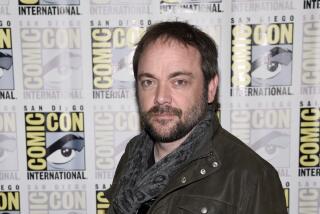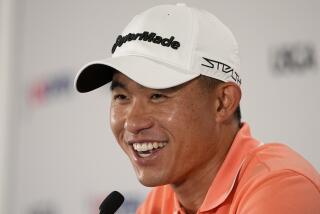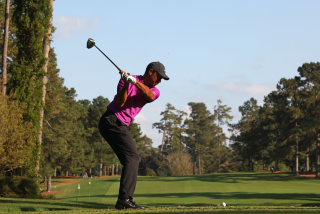New heart puts golfer beat away from PGA Tour
MIAMI -- Dressed in a faded orange shirt, blue sweat pants and sneakers, 28-year-old Erik Compton looks like just another pro golfer hoping to get back on the PGA Tour.
He launches ball after ball on the driving range, sending them more than 250 yards, though not his usual 300 yards, through the humid air toward Miami International Airport across the street.
Finally his workout ends and Compton changes his shirt, revealing the scar. It runs down his chest and hints at what sets the golfer apart: Barely five months ago, he was on an operating table for the second time in his life without a heart.
“I’ve been dead,” Compton said. “Twice.”
Now the PGA Tour has granted him special permission to use a golf cart and to continue taking banned anti-rejection pills, and the former No. 1-ranked junior golfer and two-time heart transplant recipient has a chance to add another twist to his incredible story.
------
Compton was diagnosed at age 9 with cardiomyopathy, an enlarging of the heart that hinders its ability to pump blood. Three years later in 1992, he received a new heart at Miami’s Jackson Memorial Hospital.
The Comptons’ home in south Miami was destroyed by Hurricane Andrew that August, forcing the family to move about 10 miles north near the golf suburb of Doral. Compton didn’t have the stamina -- or the frame -- for sports like football and basketball. Living in the golf paradise of South Florida, it was only natural that he tee it up.
“Honestly, I didn’t think much of him then,” said Charles DeLucca, Compton’s mentor and the president of the Dade Amateur Golf Assn. “He needed a hand cart because of his condition. He was like every other kid, only not as healthy. But I quickly found out he was special.
“He’s very confident, very strong, very driven. That’s why he heals. That’s why he gets better. He just thinks he can do it all. He thinks he can out-hit you. He thinks he can out-putt you. It’s his whole life, it isn’t just golf.”
------
Unaware of the severity of the heart attack he was suffering Oct. 3, 2007, Compton frantically drove himself from the golf course to the same hospital where he received his first transplant at age 12. His heart was running at 15% capacity, his car was going full throttle and he was calling everybody he could to tell them he loved them and to say goodbye.
“I thought it was over,” he said.
He ran through a tollbooth -- receiving a ticket in the mail a week later -- and somehow made it to the hospital alive. Doctors were able to keep him stabilized, but his condition worsened. In the following months, it became obvious he would need another heart.
“He was pretty much resigned to thinking golf was over,” renowned golf instructor and friend Jim McLean said. “He was just hoping to survive.”
Fortunate to find another donor, Compton underwent a 14-hour operation May 20. At the time, he didn’t know his wife, Barbara, was pregnant. With all the medication he has taken in his life, he didn’t even know he could still father a child.
“Erik’s whole life is a miracle,” his mother, Eli Compton, said. “The things he has done defy common logic.”
------
Compton was a top-ranked amateur and a two-time All-American at Georgia before he turned professional in 2001, playing mostly on the Nationwide Tour but also qualifying for a few PGA Tour events.
McLean, a longtime professional instructor who has mentored dozens of PGA Tour members, called Compton’s swing “one of the best I’ve ever seen in my life.”
Compton was on the putting green a month after receiving his latest heart and began playing at full speed in August.
He has put on 20 pounds since being a shriveled, pale hospital patient, and he’s again hitting the ball with pace.
“But I don’t know if he could walk five rounds without collapsing right now,” DeLucca said.
On his doctors’ advice, Compton petitioned the PGA Tour and was granted special permission earlier this month to use a golf cart like Casey Martin, who first took a similar fight in 2001 to the Supreme Court.
PGA Tour spokesman Ty Votaw declined to say how the medical review panel reached its decision, but “it’s hard to argue with a guy who’s had three hearts.” The tour will continue to evaluate Compton, who hopes to play without a cart when he has rehabilitated.
Compton has registered to play in the first stage of the PGA Tour’s qualifying school Oct. 21-24 at Crandon Golf Club on Key Biscayne, which happens to be his favorite course.
------
Compton has plenty more to look forward to than golf. His wife is due to give birth to a girl on Feb. 26, a date that has special meaning.
It’s 17 years to the day he had his first heart transplant, given to him by a young girl who died in a car accident in west Florida.
Compton did not want to disclose the name of the girl, but he often writes letters thanking the families of those whose two hearts gave him life.
His struggle to stay healthy may have no end. The average life of a transplanted heart is 11 years, meaning he could have such problems again.
Still, Compton views his condition as a blessing not a curse.
“Somebody that walks around with no perspective on life, not enjoying life, now that’s a tragedy,” he said.
“If you had everything you wanted, if everything was perfect, could you imagine how boring that would be?”
More to Read
Go beyond the scoreboard
Get the latest on L.A.'s teams in the daily Sports Report newsletter.
You may occasionally receive promotional content from the Los Angeles Times.










